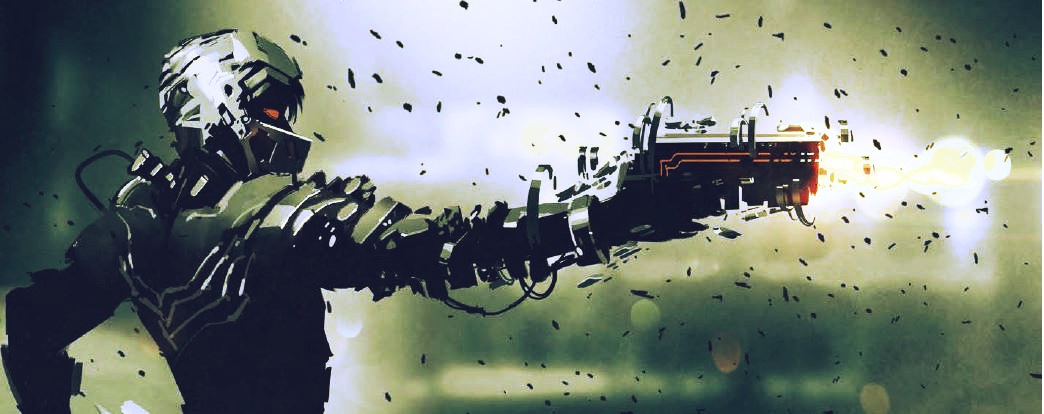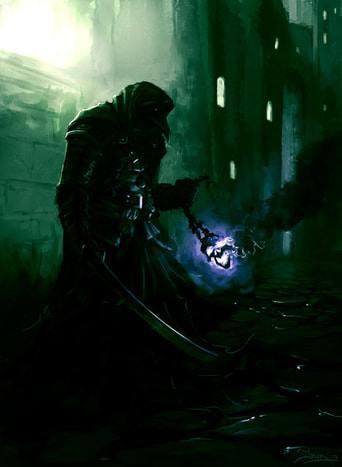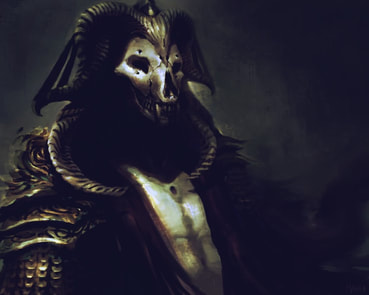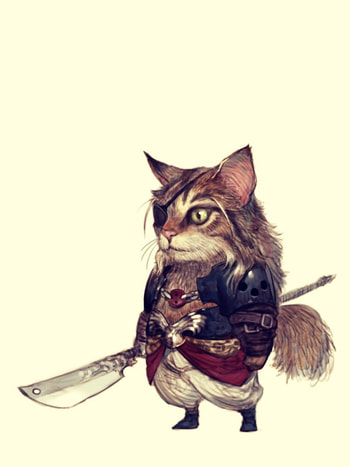|
I came to this entry after a few weeks of interpersonal fire avoidance. It drains me when I need to do it on multiple fronts, and there's a lot to be said in taking your own space, but still being supportive of others' plights. The silver lining to all of this is that it also puts me in a reflective mood. And I've been pondering on the ever-changing state of my favorite event in recent memory: The Gray Owls. It took Knight Owls 2 years to settle into its own identity, and Gray Owls is nearing that threshold. A lot has clarified in that time (like the need for two parties - I'll touch on that later). I learned a lot about the type of experience I wanted to offer over that time, and the lessons I've learned from it moving forward. What is this supposed to be?Gray Owls is a D&D experience built for mature, experienced, and resilient players. The world is dark, dangerous, and complex. It's also for 21+ players, so BYOB is allowed, and the space is safe to swear and drink and such. Mature because it allows me and the players involved to explore themes and narratives that can get a little intense. Now, with my blog on Boundaries, there are certain elements of our reality that I don't allow at the table no matter what, but things can still get deliciously twisted and that's alright. Experienced because the mechanics of the game should be clear and smooth, opening up our proverbial "action economy" to the higher nuances of our social and exploration pillars. It also implies that the player's agency should be elevated; much of the story is shaped by their choices and motivation. Resilient because it might get a little rough. Emotions can get intense, the story might get complicated, and a lot of it is painted in shades of gray. The decisions you make may not be "right," but you still need to make them however you make them. Regardless of what you choose, there will be consequences and fallout. For tone and storytelling, it becomes an landscape of mature themes, high emphasis on exploration and social interaction, with intense fights to punctuate the story beats. We've gone whole 9 hour sessions without a fight, and everyone walks away satisfied, but that makes the battle, when it comes, that much more valuable. The social contract is one of respect as players navigate an immersive game, but at the end of the day, we can't take things personally because it's still a game. The Effect So FarAfter chapters 1 and 2 of Gray Owls, the group seemed to really jive. The effect was like trying to capture lightning in a bottle. I fought for that feeling, sometimes too hard, every chapter going forward. It's true that when you're running a mature-themed scenario, where most opted in to a less than trustworthy relationship with characters, sometimes the first boss monster is the group dynamic - just growing into a dysfunctional, pyro-persuaded family that might actually trust each other. That growth was represented for Chapters 1 through 12A (our first 2-parter). John and I agree that from 12B onward marks our Phase 2 of the story. Now that the party actually trusts each other (mostly), and have united against a more or less common enemy, the momentum will only get faster toward a narrative conclusion. A year of groundwork has been laid, and dozens of moving pieces have been set in motion. I expect the players to interact with 3, maybe 4 of them, and the rest is just me playing with my toys as forces move in the background. In Phase 1 (Chapters 1-12A), the characters navigated a grim world of social manipulation, conspiracy, bounty hunters, and arson. Gray Owls is built to be intense and quick - each session picks up immediately where the last ended, given a few hours here and there. Meaning, in game time, the whole campaign has only been a little under a month. Forces and change are moving quickly, bringing our heroes into play just at the cusp of something epic. Chapters 12B to 14 were in Feathertongue, where the group was able to finally take a moment to breathe and explore without threat of discovery. Yet, something was burrowing beneath the city, and upon its attack, it supported the moment when the already huge group of 10 could split up; 6 would return to the main city of Stormwrack, while 4 would pick up 2 new allies in Feathertongue and head northward to deal with this threat from the Shadowfell. Thus marks the official Phase 2 as the party splits to pursue the two main plot threads. This also serves as a stylistic restructuring and clarification as the groups now tend toward more Cloak and Dagger and more Bug-Crushing Combat, and remain separated. This has made a world of difference in both timing - as sessions can last more around 6 hours instead of 9, and we get more done - and dynamic. We get to talk MORE and fight MORE, and everyone has been consistently more satisfied session to session. It's like the game was made for a group of 4-6 people or something! The Need For ProgressionSmaller groups means more getting done interpersonally, socially, and combatively, all while consuming less of our personal stamina. In other words, we're doing more with less, and it doesn't feel like work. This means: MOMENTUM. By now, we've spent 14 levels building up the world and our relationships in it, but unable to affect the larger scale events in big ways. Now, the characters have tools, power, and a direction, so they undoubtedly will desire to speed forward. Ahead lie tangible goals, dark secrets, and enough agency to explore them without getting caught *too* off-guard. And with each new discovery, the implications and seeds sown throughout the entirety of Phase 1 are paying off. Massive doses of interconnected lore finally recognizing their one missing piece. The last "Team Bug" session, our party in the north, enjoyed a mind-blowing experience calling back all the way to Chapter 2 and every instance moving forward. It clarified dozens of plot hooks, holes, and character misalignments. ...It's like I planned this thing, or something. It is so rewarding to watch my players figure things out. I'll give guidance where they're stuck, but Gray Owls is something special where I need to hold out just a bit longer until they're ready for the reveal. They have to EARN it in the narrative, because it will be that much sweeter to discover it in an organic way. They are getting so close. ...But not yet. Not. Yet. The Need To Slow DownOne of my players described Gray Owls as a world where the only real currency is the information you gather and how you choose to spend it. I couldn't agree more. In a Cloak and Dagger scenario (dubbed Team Tree for the group back in the city), a quick way to die is to act without knowing what you're getting into. Though the party is currently Level 17, the time when one might start fighting gods in the traditional game...with a lack of specific tactical, social, and subterfuge information, as well as mounting influence and pressure from their clashing forces, no one feels like they're level 17. And to be perfectly honest, that was the intention all along. The magical weave is broken, the druids are dead, warlocks and their patrons are being consumed, and the shadow organizations meant to keep the world safe have grown corrupt. This is not a happy fantasy, nor is it remotely safe, so navigating it requires reconnaissance with eyes and ears open. Going off on your own can be tricky, especially as those in the background move their pawns, position their knights, and prepare to flip the board. Rash decisions can still kill you, even if you might get a few good swings in at your new power level. Yet... It is not hopeless. Every session, threads of understanding are woven together in the party, with thickening webs for each personal story. Some gather at the outset, while others enjoy being closer to the center, yet all are blind to the grand weave that connects them all...and only I can see the ripples of their smallest decisions, ever-changing the flow of time and intention. Each choice, each action, sets another in motion; some predictable, many more random. And the final truth - they are strongest when together. But that won't stop a path to vengeance, or a tether to break, or a god to a raise, or a seed to plant, so they must balance between living and surviving. And that takes TIME. When social interaction is your main weapon, we have to allot appropriate time to navigate such situations. Which also means patient players, willing to listen and watch and wait for their time to shine. And this group DELIVERS with remarkable consistency in that regard. The Need For AftercareThough a dark world it is and we all knew it was coming, sometimes we just feel more than we thought we would. An interaction might spark a memory, some deep laid pain. Or something visceral brings out the fire inside that you never was there, and it has SOME THINGS TO SAY. So. We take a breath. We take a break. We talk it out if we need. Then we come back to the table. And the more these moments come up, the more resilient we become. We would never know what was going to affect us so fervently until it did, but then we can become skilled in pivoting, adapting, observing, and moving on. I also know that my lovely players and their backstories...might have become more tragic as time goes on. There can be a lot of personal pain that drives good storytelling, but that doesn't mean it won't hurt when it arrives. What has to happen when that hurt comes is a mature mind to say "it's just a game." Now, that doesn't give me license to inflict truly abusive elements onto my players (see "Boundaries"), but it does mean that I check in with them often to see where they are in their player headspace, and character space. Emotional resilience can open the door to those rougher story threads, but a player having a tough time might be unprepared for such things. So I try to time it, I try to check in, and if nothing else, I try to listen. It may be "just a game," but as John and I know, some games can change a person's life, and the people you play with can share that experience with you. You are not alone. Stamina At The TableThe more comfortable we are in our spaces, often the longer we play. At this point, I plan about 12 hours of content (with story beats and possible chapter closes throughout) every session. This ensures that if the players skip a hook or two, we're still covered in content AND if they decide to indulge in a hook or two, I've got more for next time. However, everyone has their limit. For me, it's CURRENTLY about 7 hours of play without an extended break (30-60 minutes). After that point, Exhaustion rears its ugly head. That's when notes and ideas come half-formed (even with my notes in front of me), interactions get scattered, pet-peeves creep into my psyche (harmless phones, loud jokes that pull attention, players seemingly "losing interest" [which has the added mantra of "you're a failure - you're losing them - get on your game!"]), and I start losing track of where we are and what we're doing. A Lesson: I need to close a chapter before we all fall down. There's something black magical about that prime 6:00-12:30 range; we're all on the same wavelength, running and gunning, making our plans, and executing with ease. ...But after that time, when we start pushing the 1am and 2am slots, players start dropping. Combat becomes a definitive NO, and Role-Play becomes much more like herding the proverbial cats. So, even if the players say at 12:30 "We'll play all night!" chances are they'll start dropping off by 1am, so perhaps a chapter close is still most appropriate. Our most recent session demonstrated this loud and clear. We had just done a massive, character-driven mini-arc, completely motivated and fortified by the players and their agency, and were this a book for real, that's where the chapter would end. ...And instead, we kept going. And, though most had a good time, we started struggling in small, but important ways. I started struggling in big ways. That's the marker. Hey, maybe we should stop. My personal level up is extending my personal stamina for combat and RP interactions from 5 hours to 7. Next goal will be 9, but we'll give it time. For my players, a level up for you will be to do the same; take note of when you feel yourself losing focus and you may begin to build a better sense of where your stamina lies for the Three Pillars Of Play at the table. I Love These Dumb Nerd CatsRegardless of any introspection and reflection, the sentiment remains: I love these nerds. They challenge me to be better every day, and to consistently offer something unique and worthwhile - all while adding quality to a tabletop experience. It is in these people that I see my dreams; a community, a tribe, a party. And though many of these people began as my clients, many also have become friends. I feel like that's normal in this line of work - an entertainer in multiple settings will undoubtedly reach a level of rapport with those he entertains on a consistent basis, and a GM worth their salt has to develop a strong relationship with each player. That's the experience they've come to expect, and I'm happy to deliver. I can start to relax into being human around them, as I allow and support them through their own humanity, as per my professional promise for a good experience.
And that's not to say I don't lose my cool sometimes, or they don't have an off-day, or sometimes they're not a gaggle of distracted kittens swinging flails, but this is a tabletop game and no matter how strong our social contracts, setup, rapport, or execution...we collectively and willingly invite chaos to our table. And in the name of fun, I wouldn't have it any other way. So as we march to the end of Book 1, we remind ourselves of the marathon over the sprint, of the many questions and answers to come, and remember to tackle it with maturity and patience. I will endeavor to do the same. See you at the table, ya beautiful wandering kittens. -Adamus
0 Comments
Leave a Reply. |
Adam SummererProfessional Game Master musician, music teacher, game designer, amateur bartender, and aspiring fiction author. Honestly, I write what I want when I want. Often monster lore, sometimes miniature showcases, and the occasional movie/show review.
Archives
April 2024
Categories
All
|






 RSS Feed
RSS Feed